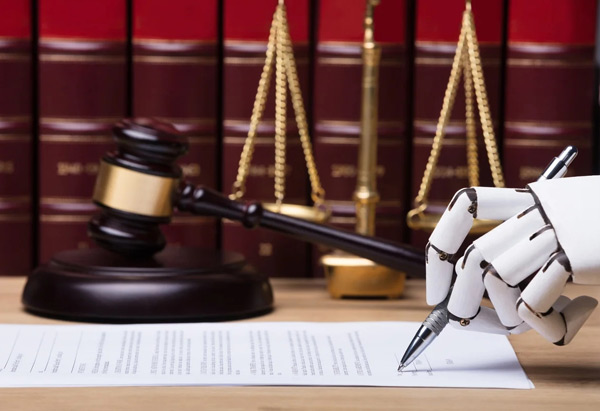Focus on global rights protection!
24-hour free consultation, professional lawyers will help you recover your losses and prevent fraudsters from going unpunished!
Opportunities and challenges for the legal services industry in the AI era

author
WilmerHale Law Firm
Release time
2025-04-16
heat
176 times
Dear President Liu Guiming, Director Zhao Zenghai, and all the distinguished guests and colleagues present, good afternoon! I am Nie Sufang, a lawyer at Beijing Jingdu Law Firm. Today, I am very honored to be invited to participate in the 19th "Guike Half-Monthly Talk" event jointly organized by Guike College and Jiawei Law Firm. Today, the theme of my report and sharing is "Opportunities and Challenges of the Legal Services Industry in the AI Era.
We all know that artificial intelligence is an inevitable trend. Whether you welcome it or not, to borrow a popular saying, "The future has come, and what is coming has already arrived." We must face and meet the challenges with a positive attitude.
When it comes to artificial intelligence, there are two main questions that come to my mind:
First, how can we keep up with the development of science and technology, use artificial intelligence to our advantage, and enhance our own industry competitiveness?
The second is how to ensure that we will not be eliminated or replaced by artificial intelligence in the tide of technological development.
The first question is how to use artificial intelligence for my own benefit.
First of all, we need to understand what application areas AI technology currently has in the legal industry, and what directions it may develop in the future. From what I know so far, the common applications of AI technology in the field of legal services include the retrieval of laws, documents, and cases, as well as case analysis and research, the drafting, review and analysis of contracts, the automatic generation of legal documents, simple legal consultation, and even the provision of assistance for some complex decision-making. Moreover, with the continuous advancement of AI technology, it is foreseeable that AI can even completely imitate people to conduct deep learning and thinking, and handle some more complex legal-related work. For example, AI can analyze and summarize the laws of similar cases by studying enough samples of judicial precedents, so as to formulate more valuable processing strategies, litigation strategies, etc. However, our human learning efficiency and ability to process information in batches cannot catch up with machines in any way, so we need to pay attention to industry trends at all times and truly use AI technology for our own benefit. The benefits that AI technology can bring to us are obvious, such as improved work efficiency, reduced time and labor costs, and more importantly, improved work results quality, etc. These are all opportunities brought to us by AI technology.
At the same time, the application of AI technology will inevitably bring many challenges, such as data security issues and professional ethics issues. These require further improvement of supporting laws and regulations. But regarding challenges, what I want to talk about today is that the rapid development of AI has brought new requirements for the transformation of lawyers' practice methods and the expansion of their practice areas. We will discuss this issue in the second part later. Let's get back to the issue of opportunities first.
How should we seize the opportunities brought by AI technology? I think we need to make attempts and efforts in the following aspects:
First, we should attach importance to strengthening technical education and training to enhance lawyers’ understanding and application of new technologies. Currently, most lawyers’ understanding and application of new technologies are based on their personal interests, and law firms and the legal profession rarely provide centralized technical training for the majority of lawyers.
Second, we need to strengthen the integration of technology and legal expertise. We have learned the technology, but how to truly use it for legal professionals is also an issue that needs in-depth research and exploration.
Third, lawyers should actively participate in the research and development of AI technologies related to legal services. This approach can well promote the integration of technology and legal expertise. This puts higher demands on legal professionals and is also what some colleagues are already doing. They are all people at the forefront of the times.
Some time ago, a friend of mine sent me an invitation from a Fortune 500 company. The company encourages employees to conduct in-depth cooperation with various industries on AI technology. My friend sent me relevant materials and asked me if I was interested in some cooperation in the legal services industry. At that time, I felt that similar products were already being made by many specialized technology companies on the market, and some products had been launched. As a law firm specializing in legal services, was it necessary to invest time, energy, and cost to do such a thing? At that time, I had a question mark in my mind, but after participating in such a discussion today, especially after understanding the development trend of related technologies, although I still have only some superficial understanding, I think I may need to rethink this issue. At least as a legal professional, we should do something at the right time and in the right way.
The second question is how lawyers can avoid being replaced by AI in the era of rapid technological development.
I think we need to change our usual working methods, explore new areas of practice, and pay more attention to cultivating our own uniqueness.
First of all, which jobs are easily replaced?
Undoubtedly, these are the jobs that can be quantified and replicated, such as data retrieval and processing, formatting texts, and so on. As we mentioned earlier, with the development of AI technology and the improvement of AI's deep learning capabilities, AI can completely process data through in-depth observation and learning, and through increasingly accurate algorithms, and finally draw more reliable conclusions. Therefore, it can be said that all problems that can be solved by algorithms are jobs that are easy or will eventually be replaced. Moreover, traditional legal work does include a lot of work such as data search and integration, text generation and processing, and simple repetitive problem consultation. Therefore, we need to use AI to break away from these jobs, change the past way of working, expand into new areas, and focus more on cultivating our own uniqueness.
Secondly, what jobs cannot be replaced by AI?
In terms of legal services, I think there are at least the following types:
First, it is work that requires complex interpersonal interaction and emotional understanding. For example, in my own field of business, criminal defense, in the process of handling a criminal case, in addition to professional services, lawyers often need to spend a considerable amount of time and energy to appease the anxiety of the parties and their families, and accompany them through the darkest moments of their lives. Although this kind of emotional companionship, understanding and support has nothing to do with the legal profession, it is a very important part of the work of criminal defense lawyers, and this kind of emotional understanding and companionship cannot be replaced by AI.
The second type is work that requires creative thinking, that is, work that cannot be solved by existing algorithms, but requires the participation and leadership of new creative thinking.
The third is work that requires personalized expression, such as litigation lawyers participating in trials, which is a process in which lawyers use knowledge and skills to persuade through unique and personalized expressions.
Fourth, it is necessary to conduct a comprehensive analysis of complex environments and backgrounds. Yesterday, a verdict on a drunk driving case went viral online. The judge started with the principle of restraint in criminal law, analyzed the legislative principles of the crime of dangerous driving, and made a detailed analysis of the dangerousness of the behavior involved. He finally applied the "but" clause of Article 13 of the Criminal Law and ruled that the defendant was not guilty. Such a verdict is the result of creative thinking, comprehensive analysis of complex environments and backgrounds, and complex emotional understanding. If a simple large language model is used to judge a case, it is probably difficult to have such a humane verdict that everyone applauds.
Therefore, in the face of changes in the digital age, if we want to avoid being eliminated, we need to give full play to our subjective initiative as human beings, think more about where human uniqueness lies in the field of legal services, and maximize our uniqueness.
Finally, I would like to end my speech today with a sentence from the invitation letter: "Seek change, seize opportunities, and win the future." Indeed, only by actively seeking change and embracing AI can we seize the opportunities that AI brings us and truly win the future!
When you encounter legal problems, you may as well leave your troubles to us
We are a team of legal professionals dedicated to protecting your rights. With years of experience and a proven track record, we provide strategic and personalized legal solutions. Let us work together to use the power of law to protect your rights and resolve your problems.


